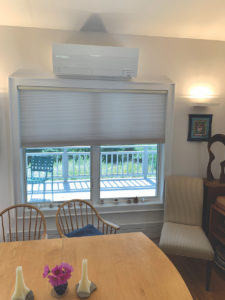So many memories get made in a summer on Cape Cod. But if one of them is of that musty cottage smell, maybe it’s time to tackle the humidity problem in your house.
Whether you’re thinking about upgrading your heat or your air conditioning, the first thing a licensed HVAC professional will do, before suggesting options, is read the temperature and humidity in your home. A systematic approach is usually recommended when the humidity indoors is over 65 percent.

Basements and lower levels are notorious spots for humidity problems. But if, during the recent hot weather, you noticed condensation on cold surfaces elsewhere — like the water tank on your toilet — you could probably benefit from a whole home dehumidification system. These are self-contained units that respond to the humidity levels in the air. Because these basic systems run on a low fan speed, they don’t use that much energy, and they’re not too expensive to install.
The humidity can also be brought under control with an update to your heating and cooling systems. If you’re considering that, look for options that include a dehumidification function. It’s an excellent feature of most of the mini-split heat pump systems many people are now installing. The brands are pretty well comparable: Fujitsu, Daikin, and Mitsubishi systems all have a “dry mode” that you can set for dehumidification.
The heat pump systems work basically by moving heat from one place to another, rather than actually heating or cooling the air. Using condensers and fans, they pull heat out of the indoor air to cool rooms in summer and, in reverse, they pull heat out of outdoor air (yes, there is warm air present in winter air) to move it indoors for heating in winter. These systems also have sensors to respond to outdoor temperatures and adjust accordingly, making them more energy efficient than gas and oil systems.
The mini-split setup that these systems employ allows you to address problem areas without taking on the whole house. I worked on one beachfront home in Truro where the owner wanted only to cool the upstairs. She explained that her tenants kept the sliders and doors constantly open on the main level, and she didn’t want to dump air conditioning onto the beach.
With air conditioning, especially, these heat pump systems are a much better solution than using window units. Going for a mini-split means, first, you’ll preserve your views, because the mini-splits are installed on a wall. Maybe more important, you’ll save a lot of energy, and see your electric bill go down significantly. The Massachusetts Clean Energy Center (masscec.com/goclean) and Mass Save (masssave.com) are starting points for finding rebates and incentives; a good HVAC professional can help you navigate the best deals out there.
Aside from the mini-splits, for larger houses there are also mini-ducted systems. They use the same heat pump technology and allow you to start with one small system and then add on as time goes by. Depending on the brand, you can install several zones on a single outdoor unit.
Most of these systems pay for themselves in energy savings in very little time. But if you really want that to happen, you have to use the systems properly. The trick is to set the system at a temperature that’s comfortable and let it respond to changing outdoor temperatures rather than turning the system on and off manually. You may think you’re saving money by turning the system off while you’re at work, but doing that will cost you about 30 percent more than if you just keep the system on.
The bottom line is, if you have not considered a system because of costs, it’s probably time to take another look. Heating and cooling technology has changed for the better, new systems are more efficient, and there are incentives to take advantage of, too. Otherwise, with the wide-ranging temperatures here on the Cape and our high humidity levels, when mildew comes to visit, it doesn’t like to leave.
Pete Beals is owner of Cape Cod Climate Solutions in South Wellfleet.
